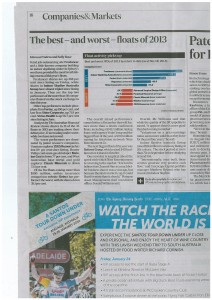Written by Edmund Tadros and Sally Rose
Feted job outsourcing site Freelancer and a little-known company building an indoor skydiving centre in Sydney’s west have provided the most breathtaking returns of this year’s floats.
Freelancer shares are up 268 per cent since listing on Friday, while shares in Indoor Skydive Australia Group have almost tripled since listing in January. They are the top two performers of the more than 30 companies floated on the stock exchange to date this year.
Other top performers include phosphate firm Fertoz, up 150 per cent, and law firm Shine Corporate, up 71.8 per cent. Virtus Health is up 56.7 per cent since listing in June.
Analysis by The Australian Financial Review shows shares in 13 of the 32 floats in 2013 are trading above their debut price, 17 are trading under water, while two have not moved.
The worst performers are dominated by junior resource companies. Uranium explorer ZEUS Resources has lost 89 per cent since listing. Hunter Valley coal seam gas developer Malabar Coal is down 77 per cent, and West Australian base metal and gold explorer Classic Minerals is down 72.5 per cent.
Of the five floats raising more than $100 million, online insurance comparison website iSelect has performed the worst, with its shares down 35.1 per cent.
The overall mixed performance comes before a December that will feature more than a dozen confirmed floats, including a $341.1 million raising from credit agency Veda Group and the biggest float of the year, a $700 million raising by television network Nine Entertainment Co.
The next biggest float of the year was Ozforex Group, which raised $439 million when it listed in October.
One investor is sceptical about the speed with which Nine Entertainment is returning to the market. “It is hard to believe that Channel Nine is a much better business than it was a year ago, but because the stock market is up, it could float for more than it should,” Platypus Asset Management chief investment officer Donald Williams said.
Generally speaking, Mr Williams said floats of businesses which have been run profitably in private hands for many years and government privatisations are more attractive than private equity exits when most of the cost savings and efficiency gains have already been made. He said it was encouraging when private equity owners planned to retain an interest in businesses they were listing, even if this did not eventuate due to an offer being oversubscribed.
“Quadrant Private Equity planned to keep a stake in fertility clinic network Virtus Health but demand for the stock at issue was overwhelming so they sold out completely,” he said.
Nine Entertainment Co’s two major shareholders, Oaktree Capital and Apollo Global Management, will retain significant holdings in the media company after it is listed.
Overall, Mr Williams said that while the quality of the IPO pipeline is mixed, “it appears there is more good than bad coming to market”.
“Valuations on a price-earnings ratios seem more solid than they have for the past four years,” he said.
THRILLS, NOT SPILLS, FOR INDOOR SKYDIVING INVESTORS
Indoor Skydive Australia Group raised $12 million in a January listing at 20¢ a share. The group’s managing director, Wayne Jones, a former member of the Australian military’s Special Air Services regiment, has an exclusive licensing agreement with United States company SkyVenture to use their technology to build indoor tunnels for simulated skydiving. The stock peaked at more than 75¢ in September before steadying around 55¢.
“Internationally, once built, these centres generate very positive cash flow,” said Greencape Capital portfolio manager Matthew Ryland, who has invested in Indoor Skydive.
“I went to facilities in Texas and Singapore to speak to management and try an indoor skydive,” Mr Ryland said. “Australia is a big market for recreational skydivers so we expect the centre at Penrith to be popular and see the opportunity to add at least another two or three locations around Australia.”
The main market will be providing a more affordable practice venue to recreational skydivers. Other markets include family and corporate outings.
Mr Ryland is hopeful Indoor Skydive Australia will secure a contract with the Australian military to use the facilities outside of regular business hours as a training venue.
View the published article:

